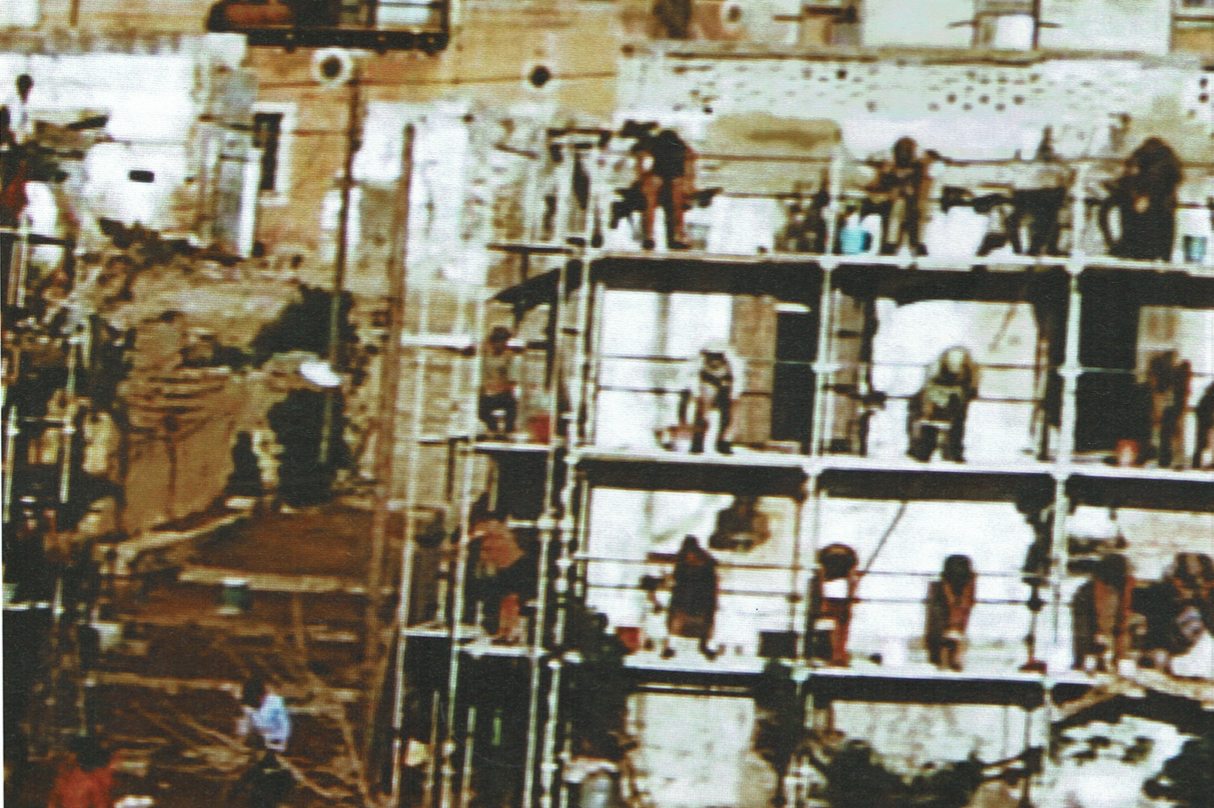The Credits of My Next Movie
Kamal Aljafari
FUSE Magazine, Palestine – Palestine, Spring Issue
2013
FUSE Magazine, Palestine – Palestine, Spring Issue
2013






The snapshots you are looking at were taken from an Israeli film musical from the 1970s, which I projected in a dark room one cold winter night in Cambridge, Massachusetts. I wanted to revisit the streets of my childhood in Jaffa. The film opens with the names of the actors and those involved in making the film - here was nothing unusual about it. These credits will become the credits of my next film, being created now. They include the names of the actors, the director, the producer and the names of those who worked in each film unit, who took part in the cinematic occupation of Jaffa. These shots are from one of the closing scenes in the same film. The actors are performing a song about democracy, which in my film I call the “Massacre of the City”
After the 1948 occupation, the Tel Aviv municipality gradually tore down the Arab city of Jaffa; thousands of houses and entire neighbourhoods disappeared. In the 1950s, the military curfew was lifted, but within another decade another invasion, a fictional one, began. Streets were blocked off, the shooting started again. In 1963, Israeli filmmaker Menahem Golan produced the first post-1948 film in Jaffa, entitled Eldorado. In 1973, he returned to direct the most successful Israeli musical of all time, Kazablan, which was also a hit in the United States. Chuck Norris began his attack on Jaffa in Golan's 1986 film The Delta Force, and later returned in Delta Force 3. The Delta Force helped Golan become a B-movie Hollywood mogul, and he headed up the production house Cannon Films.
In the 1980s and 1990s, Golan shot a dozen films in Jaffa, turning it into his private film set. Pitting Western heroes against Middle-Eastern terrorists, his films are low budget, made on the cheap, and Jaffa is their free prop: a ruined, Oriental anyplace that he had a free hand in ruining further. For the finale of The Delta Force, the Tel Aviv municipality let Golan explode a grand Palestinian schoolhouse overlooking the ocean-the Nakba as special effect.
Other Israeli and American directors would follow in Golan's footsteps, and Appointment with Death (1988), Rambo III (1988), Not Without My Daughter (1991) and The Order (2001) were all shot there. These are among the titles of Jaffa's cinematic occupation. Over the years its cast comes to include Peter Ustinov, George Sanders, Sally Field, Audie Murphy, Sylvester Stallone and Jean-Claude Van Damme. At their mercy, Jaffa is re-imagined not only as Israeli Yafo but as Beirut, Tehran, Cairo and Jerusalem; it's the battleground for every conceivable Middle-Eastern conflict, every Western projection of fear.
In all those films, Jaffa is a city where Arabs no longer exist. Preserved in this footage is also a city, alive again in moving image, its gradual destruction over the decades chronicled film by film. I find myself watching them over and over again to revisit the places of my childhood. I watch frame by frame to stop by at the shop on the corner where I once sat with my grandfather. I wander around the old city, and catch a view of the grand seaside neighbourhood of Manshiye that has since been entirely bulldozed and replaced by a grassy seaside promenade. These films compose an album of mementoes for me. I watch them to return to Jaffa. I watch them as their heroes are killing Jaffa. The time has come to intervene!
CV
Kamal Aljafari is a graduate of the Academy of Media Arts in Cologne, where he received the visual arts award of the city of Cologne in 2004. His films include The Roof (2006), which won the Best International Video Award at the 2008 Images Festival in Toronto, and Port of Memory (2009), which received the Prix Louis Marcorelles from the French Ministry of Foreign Affairs. He was a featured artist at the 2009 Robert Flaherty Film Seminar, and in 2009-2010 he was the Benjamin White Whitney fellow at Harvard University. He is currently the head of the directing program at the German Film and Television Academy in Berlin.
Palestine – Palestine is the fourth in the FUSE series States of Postcoloniality. Launched in the fall of 2011, the series has taken a distinctly artlike approach to cataloguing present symptoms of colonialism and the challenges mounted against them.
︎︎︎The Credits of My Next Movie, Fuse Magazine [PDF]
︎︎︎The Credits of My Next Movie, Fuse Magazine [PDF]

